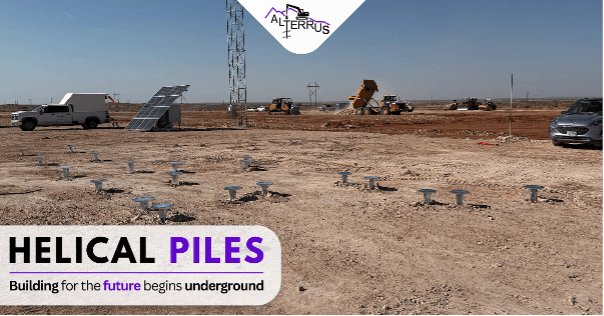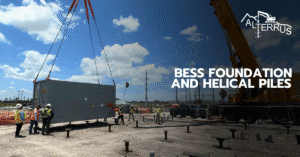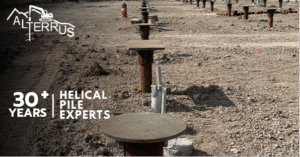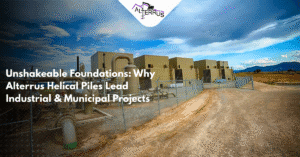Don’t let unstable West Texas soil turn your multi-million dollar asset into a liability. Learn the signs of failure and the one solution engineered for certainty.
A hairline crack in a concrete slab. A pump jack that’s no longer perfectly level. A subtle but persistent vibration in a compressor station. In the demanding environment of the Permian Basin, these aren’t minor issues to be logged and forgotten. They are the early warning signs of potential foundation failure, a silent threat that can lead to catastrophic downtime, budget-destroying repairs, and serious safety hazards.
The expansive clay and shifting soils of West Texas are notoriously unforgiving. A foundation that was adequate on day one can quickly become a project’s weakest link. The critical question is: can you spot the danger before it’s too late?
At Alterrus, we are foundation specialists obsessed with solving these high-stakes geotechnical challenges. Before you face a costly shutdown, watch for these three critical warning signs.
1. Visible Cracks and Misalignment in Equipment or Structures
This is the most obvious sign, but its severity is often underestimated.
- What to look for: Look beyond simple surface cracks. Are there “stair-step” cracks in block walls? Are concrete pads separating or showing vertical displacement? Is equipment that was once perfectly aligned, like pipe racks or skids, now showing visible gaps or signs of stress on connection points?
- Why it’s a red flag: These are not cosmetic flaws. They are direct evidence that the ground beneath your asset is shifting, sinking, or heaving. The foundation is losing its battle with the soil, and the structural integrity of everything it supports is now at risk.
2. Unexplained Operational Issues: Vibrations, Leaks, and Seizing
Foundation instability doesn’t always show up on the surface. Sometimes, the equipment tells the story first.
- What to look for: Are you experiencing unusual vibrations in rotating equipment like pumps or compressors? Have you noticed an increase in leaky flanges or stressed welds on your pipe runs? Are doors or access hatches becoming difficult to open and close?
- Why it’s a red flag: Precision-engineered equipment is designed to operate on a stable, level plane. When the foundation shifts by even a fraction of an inch, it creates immense torsional stress. This stress manifests as vibrations, premature wear on bearings, and misalignment that can lead to unexpected (and dangerous) mechanical failures.
3. Water Intrusion and Soil Erosion Around the Foundation
Water is the enemy of a stable foundation, especially in the unique soil conditions of the Permian Basin.
- What to look for: Do you see water pooling around the edges of a concrete slab after a rain? Is the soil pulling away from the foundation, creating gaps? Or conversely, is the soil pushing up and over the edge of the slab?
- Why it’s a red flag: These are clear signs of poor drainage and soil instability. Water saturates the expansive clay, causing it to swell and heave. In dry conditions, it shrinks and pulls away. This constant cycle of expansion and contraction is what destroys a traditional foundation from below, guaranteeing its eventual failure.
The Proactive Solution: Why Helical Piles Mean Certainty
Reacting to foundation failure is always more expensive than preventing it. For the challenging soil conditions of the Permian Basin, helical piles (also known as screw piles) are not just a repair method; they are a permanent engineering solution.
Unlike a shallow concrete slab that “floats” on unstable topsoil, helical piles are screwed deep into the earth, bypassing the volatile layers of clay and sand. They anchor your structure directly to a load-bearing stratum, a layer of rock or highly stable soil that is unaffected by surface moisture and shifting.
The Alterrus Advantage:
- Engineered Certainty: We don’t guess. We perform a geotechnical analysis to determine the precise depth and capacity required to secure your asset permanently.
- Rapid, Low-Impact Installation: Helical piles are installed quickly with minimal excavation, no concrete cure time, and less disruption to your ongoing operations.
- Immediate Loading: The moment a pile is installed, it’s ready to bear its full load. This makes it the ideal solution for emergency repairs or time-sensitive projects.
Don’t wait for a warning sign to become a shutdown notice. If you see evidence of foundation instability on your site, the time to act is now.
About Alterrus
Alterrus LLC is a Texas-based contractor specializing in the design, fabrication, and installation of helical pile foundations for the oil and gas, power transmission, and renewable sectors. Delivering turnkey services that encompass engineering, material supply, surveying, torque-tracked installation, and same-day as-builts, Alterrus is dedicated to providing load-tested foundations on schedule and within budget. With a zero-incident safety record and advanced technology, Alterrus is the preferred partner for construction projects requiring dependable and efficient foundation solutions.
For media inquiries, please contact:
(281) 516-5797 www.alterrusllc.com




